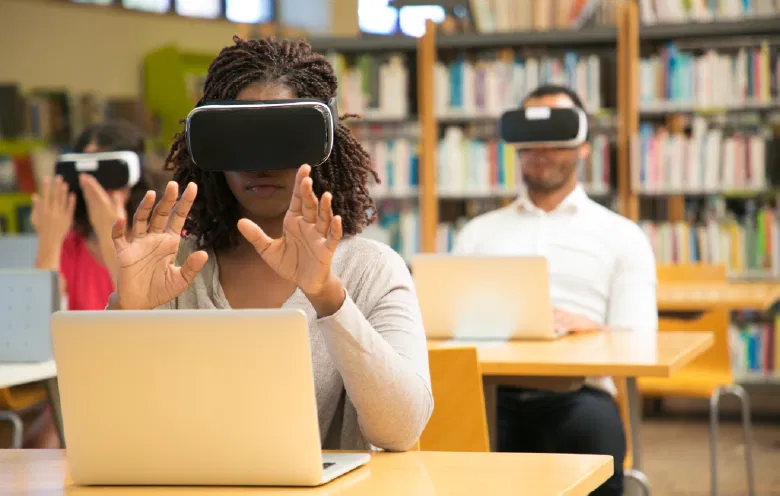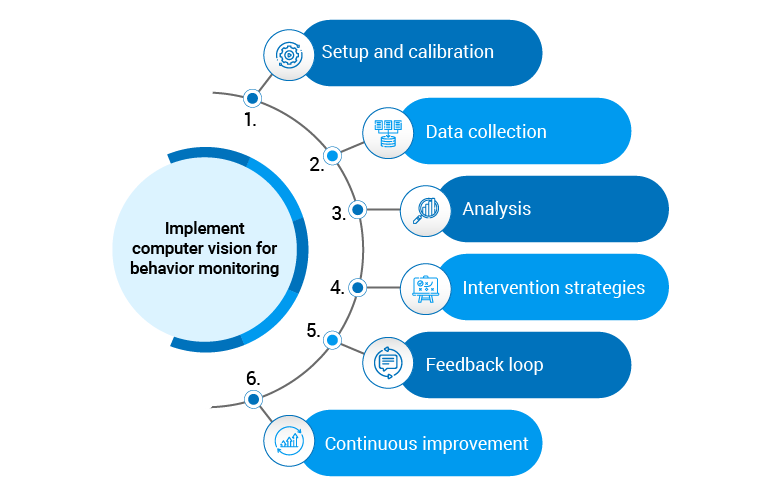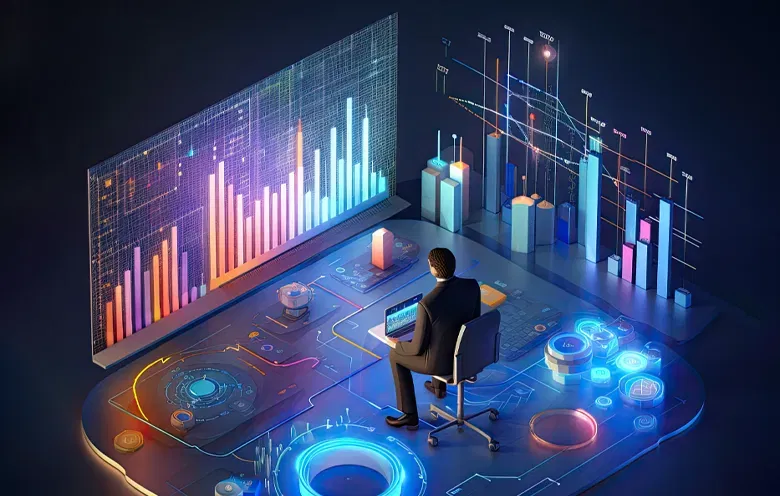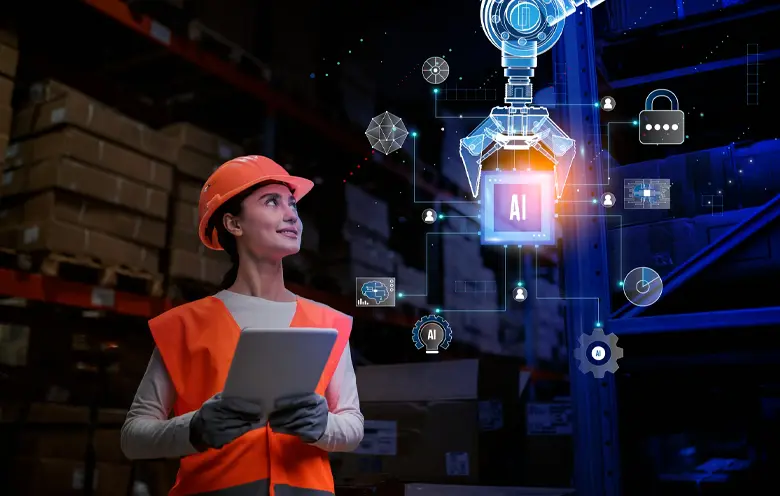Are traditional educational methods failing to meet the needs of students with special needs? The conventional one-size-fits-all approach to education often leaves those requiring specialized attention behind. This gap is pronounced for students with special needs, who thrive with personalized learning experiences tailored to their unique abilities and challenges.
Imagine a classroom where each student’s learning path adjusts in real time to their progress, strengths, and areas needing improvement. Conversations about adaptive learning technology and artificial intelligence (AI) in education are no longer futuristic dreams but present-day realities. These innovations offer unprecedented opportunities to cater to diverse learning requirements, providing customized educational experiences that enhance engagement and comprehension.
In this blog, we explore the evolution and importance of personalized education, the critical role of AI in facilitating personalized adaptive learning, best practices for implementing AI-driven education, and real-world examples of its impact. We also look ahead to emerging trends, offering a comprehensive guide to harnessing AI in education for students with special needs.
What is personalized education and how it came into the limelight
Personalized education tailors learning experiences to individual student needs, preferences, and interests. Although this concept has gained significant traction recently, it dates to the early 20th century, when educators began to recognize the limitations of traditional teaching methods. In the 1960s, the introduction of programmed instruction marked an early attempt at personalized learning. However, it wasn’t until the digital age that truly individualized education became feasible.
The historical journey of personalized education highlights several pivotal moments. For instance, in the 1980s, the advent of computers in classrooms provided new ways to customize learning experiences. By the 2000s, the rise of the internet and online learning platforms allowed for more sophisticated personalization techniques. However, it is the integration of AI that has truly revolutionized personalized learning.
AI has played a pivotal role in bringing personalized education to the forefront. Through adaptive learning technology, AI analyzes student data to tailor educational content, providing a customized learning path for each student. This has revolutionized education, making it possible to effectively address diverse learning needs, particularly for students with special needs.
Recent data underscores the impact of personalized learning. A 2024 report by the Learning Policy Institute found that schools implementing personalized learning strategies saw a 23% increase in student performance compared to traditional methods.
Importance of personalized learning for students with special needs
Personalized learning is not just a luxury, but a necessity for students with special needs. It addresses their unique challenges and learning styles, which traditional education often fails to cater to. This can lead to frustration and disengagement. However, adaptive learning technology, powered by AI, offers a solution by creating individualized learning experiences that enhance understanding and retention.
Studies show that personalized adaptive learning significantly improves outcomes for students with special needs. UNESCO’s 2023 Global Education Monitoring (GEM) Report contends that educational systems should always prioritize learners’ interests and use digital technologies to supplement rather than replace human interaction-based education. Such an initiative encourages the importance of a tailored approach to teaching while placing the student at the center of the learning process and promoting the student’s strengths.
With personalized learning experience, every student enjoys a unique educational approach tailored to their abilities and needs. This can increase motivation, reduce dropout rates, and help professors better understand each student’s learning process, enabling them to teach more effectively. AI-based systems provide insights into learning styles and progress, allowing customized teaching methods.
Moreover, personalized learning fosters a supportive and inclusive educational environment. It empowers teachers to provide targeted interventions, ensuring students receive the attention and resources they need to succeed.
Suggested: It’s important to implement AI correctly for adaptive learning. While the potential of AI in education is vast and exciting, only a few organizations realize tangible value from AI implementation. Consider reading a strategic blueprint on how businesses should and should not use AI to get the best out of AI.
How AI facilitates adaptive learning. Here are the four best practices to kick off personalized education
AI in education employs sophisticated algorithms to analyze student performance and tailor learning experiences. This involves continuous monitoring of student progress, real-time adjustments to lesson plans, and predictive analytics to anticipate future learning needs. These capabilities make personalized adaptive learning a powerful tool in advancing education.
Generative AI for adaptive learning
Generative AI can create tailored educational content that meets each student’s specific needs. This technology can generate exercises, quizzes, and learning materials aligned with students’ learning pace and style, especially those with special needs.
How our generative AI experts help you implement custom content creation:
- Needs assessment: Evaluate the specific requirements of your student population.
- GenAI tool development: Use generative AI technologies to create diverse learning materials.
- Integration: Seamlessly integrate GenAI solutions into your institute or curricula.
- Continuous improvement: Get regular updates based on student feedback and performance data.
Suggested: Did you know that AI can also give inaccurate responses? Hallucinations are not only a problem with us. AI technology also faces it. Understanding what AI hallucinations are, their consequences, what causes them, and how to prevent them is crucial for anyone working with AI in education.
Machine learning algorithms for personalized education
ML algorithms analyze vast amounts of student data to create personalized learning experiences. These algorithms assess a student’s current knowledge, learning pace, and preferences, adjusting the content and difficulty level. Our machine learning services ensure that each student receives a learning experience that is neither easy nor challenging, promoting optimal engagement and comprehension.
How we implement ML for adaptive learning:
- Data collection: Gather comprehensive student data, including academic performance, learning pace and preferences.
- Algorithm training: Use collected data to train machine learning models, ensuring they can accurately predict and adapt to student needs.
- Real-time adaptation: Implement real-time adjustments to lesson plans based on algorithmic predictions.
- Iterative refinement: Regularly update and refine algorithms based on new data and insights.
Natural language processing (NLP) for communication enhancement
NLP enhances communication in adaptive learning environments. By processing and understanding human language, NLP tools can provide personalized feedback, answer student queries, and facilitate interactive learning experiences, making adaptive learning more effective.
How our NLP experts enhance adaptive learning:
- Integration of NLP tools: Incorporate NLP tools into educational platforms to facilitate interactive communication.
- Personalized feedback: Use NLP to provide tailored feedback on student assignments and activities.
- Interactive learning: Enable real-time Q&A and interactive sessions through NLP-powered chatbots and virtual assistants.
- Continuous monitoring: Monitor student interactions and adapt NLP tools to improve communication and learning outcomes.
Computer vision for behavior and progress monitoring
Computer vision technology analyzes visual data to monitor student behavior and progress. This technology can identify signs of engagement or difficulty, allowing educators to intervene promptly.
How we implement computer vision for adaptive learning:
- Setup and calibration: Install computer vision systems in classrooms to monitor student behavior.
- Data analysis: Use computer vision algorithms to analyze visual data and identify patterns of engagement and difficulty.
- Intervention strategies: Develop intervention strategies based on insights gained from computer vision analysis.
- Feedback loop: Continuously refine computer vision systems based on feedback and new data.
How AI impacts personalized education and real-life examples
AI’s impact on student engagement
AI-driven adaptive learning significantly enhances student engagement by providing interactive and personalized content. This approach improves academic performance and boosts overall well-being by reducing frustration and increasing confidence. A recent study by the International Society for Technology in Education found that AI-driven learning environments resulted in a 37% increase in student engagement.
AI’s impact on learning outcomes
AI’s role in improving learning outcomes is profound. By tailoring educational experiences to individual needs, AI helps students achieve better results.
AI’s impact on overall well-being
The personalized approach AI facilitates significantly impacts the overall well-being of students with special needs. Reducing frustration and increasing confidence leads to a more positive educational experience. AI’s ability to identify and address learning challenges early prevents potential dropouts and supports continuous improvement in student performance.
Popular real-world examples of schools and programs using AI for personalized education
Example 1: Harvard Business School
Harvard Business School has implemented AI-driven adaptive learning in its curriculum. This approach enables students to learn at their own pace, with the AI system monitoring their progress and adjusting the course material accordingly. This results in a more personalized and effective learning experience, allowing students to focus on specific areas that require improvement. By leveraging AI, the school realized a 38% increase in student satisfaction and significant improvement in academic achievement.
Example 2: MIT Sloan School of Management
MIT Sloan School of Management has implemented AI-driven adaptive learning systems to enhance its students’ learning experience. This approach allows for personalized and dynamic curricula that adjust to each individual’s learning pace and abilities. The system can identify knowledge gaps and provide targeted support by leveraging machine learning algorithms. This approach aims to increase student engagement, improve learning outcomes, and provide a more effective and efficient education.
Emerging trends in AI and adaptive learning
The future of AI in special education looks promising, with potential advancements including more sophisticated machine learning algorithms, enhanced natural language processing capabilities, and improved computer vision systems. These advancements will further enhance personalized learning experiences and outcomes for students with special needs.
Looking ahead, the integration of AI in personalized adaptive learning is expected to become even more seamless and intuitive. The long-term vision includes fully automated, real-time educational content adaptation, continuous student progress monitoring and analysis, and proactive interventions to address learning challenges.
Let’s embrace the future of personalized education
AI-driven adaptive learning is transforming education. By providing personalized learning experiences, AI enhances student engagement, improves learning outcomes, and promotes overall well-being. As AI technology advances, personalized education’s future looks brighter than ever.
Embrace AI-driven adaptive learning and unlock your students’ full potential. Implementing AI in your educational strategies is not just an option but a necessity in today’s dynamic learning environment.






